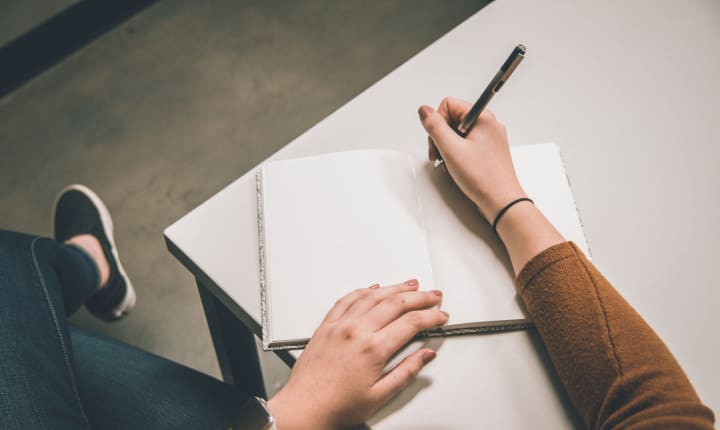How to Use Journaling to Reduce Your Stress and Anxiety
If you’re suffering from anxiety, journaling can hold the key to relief.

Just about everyone who has been in a moment of extreme stress has experienced it—the flood of negative thoughts, the inability to concentrate, the feeling of everything crashing down ahead of them, and of course that lost feeling of not knowing what to do next. It’s a feeling that your mind is running amok, and that you have no way to regain control of it.
I know this “head rush” all too well. Prior to writing out my thoughts, I would go into full-blown panic attacks on a regular basis. It was only after my doctor suggested I start journaling that I was able to manage my stress. You could actually say it was a breakthrough for me.
Journaling is one of the most effective ways to reduce stress and help ease the occurrence of “runaway thoughts.” It forces you to lay out your thoughts on paper in a simple and effective way, and requires you to take things one step at a time. Ever since I started, I was able to get control of my stress.
It’s so commonly used that even modern mobile apps like LifeShift by Moodshift use the principles of journaling to relieve stress and help you think clearly. After getting my worries under control, I started to use journaling as a way to help make my life better. Here’s my advice for people who are just starting out.
First, grab a journal and start setting aside 5 to 15 minutes every day.

Most people who start journaling as an anxiety reduction exercise find little time to do it at first. This actually was my biggest struggle. I have a tight schedule, you know! With journaling, everything counts in large amounts.
Even a small step is better than no step. A good way to embark on this journey is to set aside time in your routine for your journaling. This is actually the hardest part for most people who are just starting out.
However, time isn’t always the “killer factor.” If you can’t always grab a pen and notebook, you might want to invest in an app like LifeShift by Moodshift, which uses a mobile app to give you guided journaling sessions. No pen or paper required.
Journal with a purpose.

Photo by Hannah Olinger on Unsplash
When you’re stressed and anxious, you probably already know what’s eating at you. One of the easiest ways to start journaling to alleviate stress is to describe the problem you’re facing, why it’s bothering you, and how you feel about it. This slows down your train of thoughts and helps you form a more coherent way of thinking about things.
Though there are plenty of suggested ways you can journal, there’s no right or wrong technique to use. I find that “free-forming” worked best for me, but you might do better with list items. It’s all good. Journaling is a very private matter, and that how you choose to do it is up to you at the end of the day.
Let your feelings do the talking.
Journaling has one benefit that no other form of stress relief offers—a total lack of judgement. You don’t have to worry about people telling you that you’re wrong, or that you’re messed up. Journals don’t talk back. That makes them perfect vehicles for venting and parsing out feelings you often keep buried inside.
Studies have shown that journaling, especially about issues we normally keep to ourselves, tends to help alleviate symptoms of PTSD, anxiety, and worry. If you feel like tackling certain issues you’ve avoided at therapy, this would be a good way to do it.
Try to mix some good in with the bad.

Photo by Brad Neathery on Unsplash
Though there are definitely exceptions to the rule, most people who constantly journal negative things don’t always feel as good as they could after a session. This is why most journaling guides, including LifeShift, suggest taking a look at the positive sides of things.
I noticed that when I started using my journal as a venting book, I would walk away from sessions mildly relieved, but upset. After balancing out my perspectives on life, my sessions started to make me feel even better.
This is particularly useful if you’ve noticed that your journaling sessions have turned into upsetting rituals. For example, if you just went on a long rant about life in your journal about negative moments in life, you might want to finish by talking about things that make you feel relaxed—or hopes for the future.
Focusing heavily on the positive can help you journal your way to a better mindset.
Another interesting way people have used journals is to omit negative thoughts altogether while they write, and focus on the positives. This way of journaling can help you cultivate a more optimistic mindset by literally forcing you to focus on the nicer aspects of life.
Choosing this route of journaling will help you reduce stress over time by giving you a more upbeat outlook on life. This can also be used to encourage gratitude and also just help you work to overcome depression.
It’s very easy to get lost in your journaling habits, especially if you have a mind that tends to get filled with disorganized thoughts. A little guidance never hurts! In many cases, guided journaling sessions can help you see things from a different perspective or just improve your ability to unwind.
LifeShift is an excellent tool for people who want to journal efficiently, get their minds cleared out, relieve stress, and also learn about themselves. They use a method called the Shoshin Technique to help people delve into their thoughts.
The Shoshin Technique uses non-judgemental questions that are designed to help you focus, clear your mind, and encourage you to find solutions to your problems. It’s a lot like the Socratic Method of using questions as a way to help people see things with a new set of eyes, but applied to wellness instead.
Read your old answers to gain perspective.
Hindsight really is 20/20. In most situations, the things you worried about really aren’t that big a deal in the long run. You can actually learn this valuable (and stress-reducing) lesson by taking a look at your old writings.
When I started journaling, it was re-reading my old entries that made such a huge difference. I realized that most of the things that I panicked about never really happened. So, why was I so jittery?
The more you realize that things don’t really hit the fan in most cases, the less likely it is that you’ll panic over the little things in life. By journaling your worries away, you’re giving your future self a solid record proving that there’s probably no reason to get so anxious about every little thing.
Of course, you can also journal to help you keep track of your goals.

Photo by João Silas on Unsplash
Journaling has also been proven to be extremely effective as a way to remind yourself to stay on task—not to mention chart progress towards your dreams. The more you make steps towards your future success, the better off you’ll be.
Using a journal to track the things you have done to accomplish a goal has been statistically proven to help you attain the results you’ve wanted to see. Even just writing down your daily mini-accomplishments makes you more aware of how close you are to achieving your goal. This is why using a food journal can double weight loss.
Getting into a goal-setting journaling flow is simple. Just list your goals, keep track of progress, and jot down the steps you do to help achieve those goals every day!
Finally, you can also use it as a tool to help you understand your coping mechanisms better.
The best part of journaling is how much it can help you find even more ways to reduce your anxiety through the art of introspection. All you have to do to unlock even more paths to wellness is to learn what questions you need to answer through writing.
A little help can definitely prove to be useful here, even if you’re a veteran journaler. If you’re not sure where to start, apps like LifeShift by Moodshift can help. After all, life is all about shifting your perspective, isn’t it?
About the Creator
Mackenzie Z. Kennedy
Socialite and dating guru Mackenzie Kennedy knows all about the inner workings of people and society as a whole. It's not only her lifestyle - it's her passion. She lives in Hoboken with her pet dogs, Cassie and Callie.






Comments
There are no comments for this story
Be the first to respond and start the conversation.